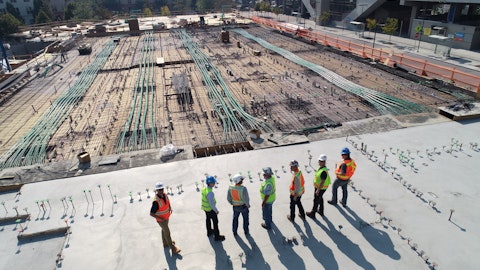Jade Rahmani: Thank you very much. Just regarding the guidance, how much does capital markets and leasing picking up in the back half of the year drive the guidance? Is that really the main uncertainty in the guidance?
Emma Giamartino: Yes, and it’s primarily capital markets that we’re really expecting to pick up, mostly in Q4. Just to give, Jade, a little context around that, if our sales revenue comes in 5% lower than what we’re expecting, for the full year that would have about a $0.02 EPS impact. Then on the leasing side, we’re not relying on a massive rebound at the end of the year, but obviously we’re guiding towards less of a decline in leasing for the full year. For leasing, if there’s a 5% decline in revenue versus what we’re expecting right now, that would have more like a 3% change to EPS, and on the sales side, I meant 2% change to EPS.
Jade Rahmani: Okay, great. That’s really helpful to have. On the office side, is the uncertainty there, which seems secular in nature, causing a re-think of, I guess, resource allocation in that space, in that property sector, and any re-think of how that outfit is organized?
Bob Sulentic: Well, we have–Jade, we have multiple places that we play in the office sector, so starting with development, we develop it, we manage it, we sell it, we finance it. We’ve sized our business and our capital allocation strategy consistent with the assumptions that we’ve talked about here today, about where that business is going to be. The other place we play in the office sector is in our investment in Industrious. We think Industrious is going to continue to grow at a healthy clip. It’s a really good offering with a really strong leadership team, and we are looking at that to be likely a bigger part of our business going forward. But we expect leasing to be as we described. We don’t expect to do much development, although we’ll do some development on build-to-suits – that will continue to be part of our business, and that’s great business when you can do office build-to-suits with credit tenants, and that’s what we would do.
Then over time–there’s all kinds of uncertainty about what’s going to happen in the financing markets, but over time there will be a good amount of financing work in the office space as well.
Jade Rahmani: Thank you very much.
Operator: Thank you. Our next question is from the line of Patrick O’Shaughnessy with Raymond James. Please go ahead.
Patrick O’Shaughnessy: Hey, good morning. I was wondering if you could speak to how you’re thinking about free cash flow conversion as a percentage of your core net income in 2023.
Emma Giamartino: Yes, so we expect it to be roughly in line with where we were in 2022, which was about 75% free cash flow conversion. What’s important to note about that is because we’re in somewhat of a–we are in a declining market, there is inconsistency in timing in terms of how we accrue our bonuses and how we pay them out in cash. If you normalize for that timing in 2023, our free cash flow conversion is closer to mid-80s, which is where we want to be long term, so we should expect coming into 2024 that we should hit a more normalized growth environment in that mid-80% free cash flow conversion range.
Patrick O’Shaughnessy: Got it, thank you. What are you guys seeing right now in terms of talent retention? Given the slowdown in some of the brokerage areas, are brokers more inclined to want to move from place to place, or do you feel like you are able to retain all the key talent that you want to?





